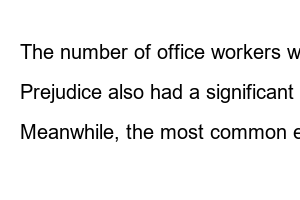벼룩시장 구인구직According to the results of a survey conducted on 1,716 office workers by Flea Market Recruitment (CEO Jang Young-bo), which provides jobs closely related to daily life, 92.5% of office workers answered that they had experienced prejudice while at work.
Among the prejudices experienced by office workers, ‘educational background (23.4%)’ ranked first, followed closely by ‘gender (23.1%).’ This was followed by ‘age (15.2%)’, ‘marital status (10.1%)’, ‘work ability (9%)’, ‘appearance (7.6%)’, ‘place of origin (6.3%)’, ‘past actions, incidents’ (3.4%)’, followed by ‘health status (1.9%)’.
Prejudice was most commonly experienced in employees who had been employed for less than 6 months (29.8%), and between 6 months and 1 year (28.1%), indicating that more than half of the employees were experiencing prejudice in their first year of employment.
In particular, there was a difference in the prejudice experienced depending on gender, which attracted attention. In the case of male office workers, the largest number of respondents (34.8%) said they felt prejudice based on ‘educational background’, while 29.7% of female office workers felt prejudice based on ‘gender’, showing that men and women experience different prejudices.
In addition, male office workers felt relatively greater prejudice in terms of ‘age’, ‘work ability’, and ‘region of origin’, while women felt relatively greater prejudice in terms of ‘educational background’, ‘age’, and ‘marital status’.
The number of office workers who responded that they were disadvantaged at work due to such prejudice reached 68.5%.
Specifically, 21.5% of respondents responded that they had received ‘unreasonable personnel evaluations’, followed by ‘being forced to do difficult work (16.7%)’, ‘punishing performance (15.1%)’, and ‘excluding them from major projects (11.8%)’ , there were also responses that they experienced disadvantages such as ‘insulting expressions and verbal abuse (11.3%)’, ‘gossip or rumors (10.6%)’, and ‘ostracism (10.5%)’.
Prejudice also had a significant impact on work life.
The largest number of respondents said, ‘I lost my motivation and passion for work (30%),’ and there was also an opinion that ‘my loyalty to the company disappeared (18.3%).’ In addition, ‘I developed a sense of inferiority that I never had before (17.3%)’, ‘My personality changed in a negative direction (12%)’, ‘I experienced health problems such as headaches and indigestion (11.1%)’, and ‘I made more frequent work mistakes (6.5%). )’ was also an office worker.
Meanwhile, the most common efforts made by office workers to overcome prejudice were ‘silently endured’ at 39.9%, followed by ‘showed through work performance and attitude (30.1%)’, ‘did not make much effort (11.8%)’, and ‘overcame’. This was followed by ‘I couldn’t do it and left the company (9.4%)’ and ‘I resolved the misunderstanding by talking directly to the person involved (8.7%).’

